Connect With Us
Blog
Items filtered by date: February 2024
Facts About Rheumatoid Arthritis in the Feet
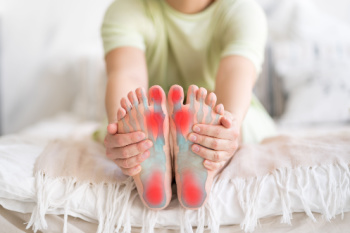
Rheumatoid arthritis, or RA, is an autoimmune disorder that affects millions of people worldwide, causing chronic inflammation, pain, and stiffness in the joints. When it comes to RA, the feet are often overlooked despite being commonly affected. In fact, up to 90 percent of individuals with RA will experience symptoms in their feet and ankles at some point. This condition can lead to deformities such as bunions, hammertoes, and claw toes, as well as the formation of painful nodules called rheumatoid nodules. Additionally, RA can erode the cartilage and bone within the joints, resulting in severe pain and difficulty walking. Foot pain and deformities can significantly impair mobility and diminish quality of life for individuals with RA. Early diagnosis and aggressive treatment are essential for managing symptoms and preventing irreversible damage to the joints. If your feet are showing signs of rheumatoid arthritis, it is strongly suggested that you are under the care of a podiatrist who can provide you with effective relief measures.
Because RA affects more than just your joints, including the joints in your feet and ankles, it is important to seek early diagnosis from your podiatrist if you feel like the pain in your feet might be caused by RA. For more information, contact Vivian C. Iwu, DPM of Choice Podiatry Center. Our doctor will assist you with all of your podiatric concerns.
What Is Rheumatoid Arthritis?
Rheumatoid Arthritis (RA) is an autoimmune disorder in which the body’s own immune system attacks the membranes surrounding the joints. Inflammation of the lining and eventually the destruction of the joint’s cartilage and bone occur, causing severe pain and immobility.
Rheumatoid Arthritis of the Feet
Although RA usually attacks multiple bones and joints throughout the entire body, almost 90 percent of cases result in pain in the foot or ankle area.
Symptoms
- Swelling and pain in the feet
- Stiffness in the feet
- Pain on the ball or sole of feet
- Joint shift and deformation
Diagnosis
Quick diagnosis of RA in the feet is important so that the podiatrist can treat the area effectively. Your doctor will ask you about your medical history, occupation, and lifestyle to determine the origin of the condition. Rheumatoid Factor tests help to determine if someone is affected by the disease.
If you have any questions please feel free to contact our office located in Marietta, GA . We offer the newest diagnostic and treatment technologies for all your foot and ankle needs.
Stretching Exercises The May Improve Plantar Flexion
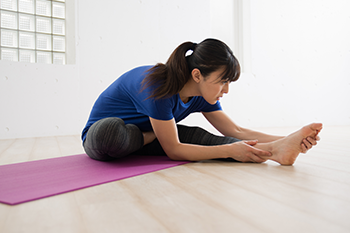
Plantar flexion, the action of pointing the toes away from the body, is vital for everyday activities like walking and driving. Weakness in plantar flexion can lead to changes in gait, tightness in the lower back muscles, and stiffness in the calf muscles. Incorporating specific foot exercises into your routine is a good way to improve plantar flexion. Try the downward ankle stretch, holding the foot in a pointed position for 30 to 60 seconds while seated or standing, and rotate the ankle for added benefit. Another effective exercise involves tracing the alphabet with each foot while seated, promoting muscle engagement and flexibility. For added resistance, loop an exercise band over the toes, slowly pointing and flexing the feet against the resistance. Performing these exercises three to five times per week can improve plantar flexion strength and enhance lower limb function. Strengthening plantar flexion can contribute to better mobility, reduced discomfort, and improved overall quality of life. Before starting a new exercise program, particularly if you have pre-existing foot or ankle conditions, it is suggested that you consult a podiatrist.
Exercising your feet regularly with the proper foot wear is a great way to prevent injuries and build strength. If you have any concerns about your feet, contact Vivian C. Iwu, DPM from Choice Podiatry Center. Our doctor can provide the care you need to keep you pain-free and on your feet.
Exercise for Your Feet
Exercise for your feet can help you gain strength, mobility and flexibility in your feet. They say that strengthening your feet can be just as rewarding as strengthening another part of the body. Your feet are very important, and we often forget about them in our daily tasks. But it is because of our feet that are we able to get going and do what we need to. For those of us fortunate enough to not have any foot problems, it is an important gesture to take care of them to ensure good health in the long run.
Some foot health exercises can include ankle pumps, tip-toeing, toe rises, lifting off the floor doing reps and sets, and flexing the toes. It is best to speak with Our doctor to determine an appropriate regimen for your needs. Everyone’s needs and bodies are different, and the activities required to maintain strength in the feet vary from individual to individual.
Once you get into a routine of doing regular exercise, you may notice a difference in your feet and how strong they may become.
If you have any questions please feel free to contact our office located in Marietta, GA . We offer the newest diagnostic and treatment technologies for all your foot and ankle needs.
It's Time for Beautiful Feet
Custom Orthotics For Seniors

Age gracefully and move freely with Custom Orthotics. For seniors seeking to maintain their independence, Custom Orthotics offer the stability and comfort essential for daily activities. Custom-tailored to your feet, they provide support, reduce pain, and enhance mobility, ensuring you're always on sure footing. Don't let age-related foot concerns hold you back. With Custom Orthotics, embrace every golden moment with confidence. Call today to schedule an appointment.
Possible Foot Problems From Wearing High Heels
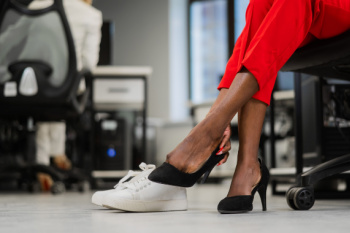
High heels, while fashionable, can lead to various foot problems due to their design and the way they alter the natural mechanics of walking. One common issue is the development of bunions, where the pressure and narrow toe box of high heels force the big toe to bend outward, causing a painful bony bump to form. Additionally, wearing high heels regularly can shorten the Achilles tendon and calf muscles, leading to stiffness and discomfort when walking in flat shoes. High heels also increase pressure on the ball of the foot, potentially causing metatarsalgia, a painful condition characterized by inflammation and discomfort in the ball of the foot. Furthermore, the instability caused by high heels can contribute to ankle sprains and instability over time. To mitigate these issues, it is important to limit high heel wear, opt for lower, wider heels when possible, and incorporate foot-strengthening exercises into your routine to counteract the negative effects of high heels on foot health. If you wear high heels and have developed specific foot conditions, it is suggested that you consult a podiatrist who can effectively treat any foot ailment that has arisen, and offer other footwear choices.
High heels have a history of causing foot and ankle problems. If you have any concerns about your feet or ankles, contact Vivian C. Iwu, DPM from Choice Podiatry Center. Our doctor can provide the care you need to keep you pain-free and on your feet.
Effects of High Heels on the Feet
High heels are popular shoes among women because of their many styles and societal appeal. Despite this, high heels can still cause many health problems if worn too frequently.
Which Parts of My Body Will Be Affected by High Heels?
- Ankle Joints
- Achilles Tendon – May shorten and stiffen with prolonged wear
- Balls of the Feet
- Knees – Heels cause the knees to bend constantly, creating stress on them
- Back – They decrease the spine’s ability to absorb shock, which may lead to back pain. The vertebrae of the lower back may compress.
What Kinds of Foot Problems Can Develop from Wearing High Heels?
- Corns
- Calluses
- Hammertoe
- Bunions
- Morton’s Neuroma
- Plantar Fasciitis
How Can I Still Wear High Heels and Maintain Foot Health?
If you want to wear high heeled shoes, make sure that you are not wearing them every day, as this will help prevent long term physical problems. Try wearing thicker heels as opposed to stilettos to distribute weight more evenly across the feet. Always make sure you are wearing the proper shoes for the right occasion, such as sneakers for exercising. If you walk to work, try carrying your heels with you and changing into them once you arrive at work. Adding inserts to your heels can help cushion your feet and absorb shock. Full foot inserts or metatarsal pads are available.
If you have any questions please feel free to contact our office located in Marietta, GA . We offer the newest diagnostic and treatment technologies for all your foot and ankle needs.
How Custom Orthotics Might Help Older Adults
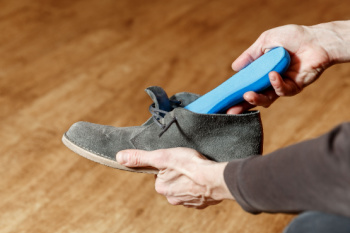
Custom orthotics can play a significant role in improving balance and stability for older adults. As individuals age, various factors, including muscle weakness, joint stiffness, and changes in sensory perception, can lead to balance issues. Custom orthotics are tailored to the specific needs of individuals, addressing these concerns effectively. One way orthotics aid balance is by providing proper arch support. Flat feet or fallen arches can disrupt the alignment of the feet and lower limbs, affecting balance. Custom orthotics with arch support help realign the feet, reducing the risk of tripping or stumbling. Additionally, orthotics can redistribute pressure on the soles of the feet, reducing discomfort and enhancing stability. This is particularly beneficial for older adults with conditions like arthritis or diabetic neuropathy, which can affect sensation in the feet. Further, custom orthotics can improve gait mechanics, ensuring a more natural and steady walking pattern. By promoting better foot and ankle alignment, orthotics can reduce the likelihood of falls and injuries. If you are an older adult and would like to understand whether custom orthotics might benefit you, it is suggested that you make an appointment with a podiatrist today.
If you’re experiencing foot discomfort, have a history of foot and ankle injuries, or are interested in exploring Custom orthotics, don’t hesitate to contact Vivian C. Iwu, DPM at Choice Podiatry Center. Our doctor is dedicated to offering the care required to help you remain pain-free and stay on your feet.
What are Custom Orthotics?
Custom orthotics refer to custom inserts designed for placement in different shoe types, including athletic and formal footwear, with the purpose of alleviating a spectrum of foot-related problems such as flat feet, heel pain, and overall foot discomfort. These inserts are instrumental in providing relief and comfort for a diverse range of foot conditions, including heel pain, and can also act as a proactive approach to injury prevention.
Medical Grade Shoe Inserts:
A diverse array of shoe inserts is available for addressing foot pain, heel discomfort, and minor issues. For instance, you can place arch supports in your shoes to rectify overarched or flat feet, and gel and cushioned insoles are frequently chosen for the comfort and relief they provide from foot and heel pain by reducing pressure.
If you have any questions please contact our office located in Marietta, GA . We offer the newest diagnostic and treatment technologies for all your foot and ankle needs.
Recognizing Common Symptoms of Plantar Fasciitis
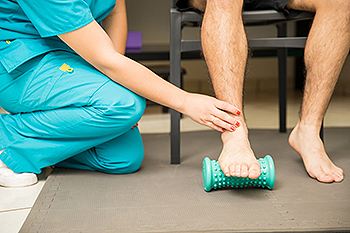
Plantar fasciitis unveils itself through a multitude of distinctive symptoms, each signaling the need for attention to alleviate discomfort. The hallmark of this ailment is a sharp pain that typically emanates from the bottom of the heel and is often experienced during the first steps in the morning or after prolonged periods of rest. The pain tends to subside with continued movement but may resurface after extended activity. Swelling and tenderness along the arch of the foot are common indicators, as is increased discomfort when walking barefoot or on hard surfaces. Individuals with plantar fasciitis may notice stiffness in the affected foot and a heightened sensitivity to pressure on the heel. Recognizing these telltale signs is pivotal for timely intervention and effective management. If you have heel pain, it is suggested that you contact a podiatrist who can determine if plantar fasciitis has developed and can treat it accordingly.
Plantar fasciitis is a common foot condition that is often caused by a strain injury. If you are experiencing heel pain or symptoms of plantar fasciitis, contact Vivian C. Iwu, DPM from Choice Podiatry Center. Our doctor can provide the care you need to keep you pain-free and on your feet.
What Is Plantar Fasciitis?
Plantar fasciitis is one of the most common causes of heel pain. The plantar fascia is a ligament that connects your heel to the front of your foot. When this ligament becomes inflamed, plantar fasciitis is the result. If you have plantar fasciitis you will have a stabbing pain that usually occurs with your first steps in the morning. As the day progresses and you walk around more, this pain will start to disappear, but it will return after long periods of standing or sitting.
What Causes Plantar Fasciitis?
- Excessive running
- Having high arches in your feet
- Other foot issues such as flat feet
- Pregnancy (due to the sudden weight gain)
- Being on your feet very often
There are some risk factors that may make you more likely to develop plantar fasciitis compared to others. The condition most commonly affects adults between the ages of 40 and 60. It also tends to affect people who are obese because the extra pounds result in extra stress being placed on the plantar fascia.
Prevention
- Take good care of your feet – Wear shoes that have good arch support and heel cushioning.
- Maintain a healthy weight
- If you are a runner, alternate running with other sports that won’t cause heel pain
There are a variety of treatment options available for plantar fasciitis along with the pain that accompanies it. Additionally, physical therapy is a very important component in the treatment process. It is important that you meet with your podiatrist to determine which treatment option is best for you.
If you have any questions, please feel free to contact our office located in Marietta, GA . We offer the newest diagnostic and treatment technologies for all your foot care needs.


